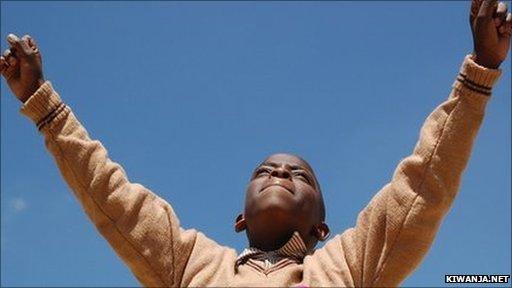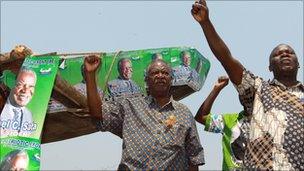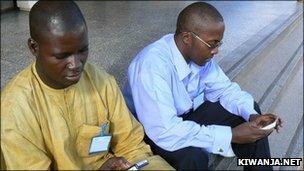Africa's quiet digital revolution
- Published

Taking small steps towards community awareness is giving Africans a voice
Facebook and Twitter may have grabbed the headlines during the Arab Spring uprisings but on the African sub-continent an altogether quieter digital revolution is taking place.
Services begun in the UK to help allay middle-class indignation about the the lack of transparency from MPs is playing an increasingly important role in bringing democracy to countries that have known little.
MySociety founder Tom Steinberg created TheyWorkForYou to offer greater dialogue between citizens and MPs, following the huge success of his FixMyStreet platform.
Now a version of TheyWorkForYou is due to launch in Kenya. It offers something that Facebook cannot, thinks Mr Steinberg.
"If you see all your friends saying they are going to bring down the president then Facebook is unrivalled but societies are not held together by people going on mass protests," he said.
There is, he said, a gap in the market for more prosaic services that improve people's day-to-day lives.
"It offers tools for people who don't believe they have any power. That is not the stuff for social networks. It is the opposite to a cute kitten video," he added.
"One website is obviously not the whole answer but we hope that it will explain the basics of who politicians are and give them a human face in a country where people vote because others tell them to," he said.
Africa's move to aggregating and crowd-sourcing content began with the now famous Ushahidi platform.

Being able to monitor elections, such as the recent polls in Zambia, in real-time is invaluable
After the disputed Kenyan elections, it played a key role in identifying outbreaks of violence and has since been adopted around the world.
Philip Thigo, an adviser with Nairobi-based non-governmental organisation Sodnet, is using the platform for his Uchaguzi election-monitoring project which allows citizens to report incidents of violence in elections across Africa.
"In Kenya it has changed how elections are monitored. It is working in real-time to impact elections as they take place, creating pressure on officials to act," he said.
It has been used in recent elections in Uganda and Zambia and has spawned a similar tool that has more long-lasting applications.
The Huduma platform has drawn inspiration from MySociety projects to create a place where citizens can report day-to-day issues.
"If they go to hospital and don't get the medicine they should have, they can report it," he said.
Users can report problems with health and education services as well as with water supplies and the justice system.
According to Mr Thigo, the government has responded to problems reported.
The system has been tested in Kenya, Nigeria, Mozambique and Zambia and is due to go live soon.
In a continent where communication between governments and citizens has been minimal, this is a huge step, thinks Mr Thigo.
"It starts small but citizens can demand change," he said.
Radio chat
For many in Africa, getting information still comes from a very low-tech device - the radio.
Ken Banks hopes to unite the power of radio with his already well-known FrontLineSMS, a text service that has provided key information to people caught up in emergencies such as the earthquake in Haiti.
Now he wants to see the project more embedded into daily lives, offering listeners to radio stations in Kenya and Zambia the chance to really engage with the topics discussed on their favourite radio stations.
"Clearly rural radio and mobile technology are a potent mix. Independently, both are making significant contributions - both directly and indirectly - to the communities they seek to serve. Together there is every chance they could achieve yet more," he said.
Listeners will be able to text in to radio shows, allowing stations to aggregate content, identify the trends that are concerning people and build shows around specific topics.
Ida Jooste, who works for Internews, a non-governmental organisation that trains many of the DJs who run such radio stations, thinks it will be an invaluable tool.
"When texts are read on air they may not be representative. SMS Radio will aggregate material around themes such as poverty or cholera and allow the DJ to know what the concern of the day is," she said.

As mobile use explodes so do text-based services offering invaluable advice and information
Mobilising youth
As mobile phone ownership explodes in Africa, so are text-based services offering vital health information such as letting mothers know when to immunise their children or putting farmers in touch with reputable suppliers.
Susan Kariuki, chief executive of Kenyan Youth Agenda, is using texts to both give youngsters a say in their communities and help expose corruption.
Its tool invites young people to text in examples of corruption in the key areas of education, health and water.
Ms Kariuki explained that texts sent in have already made a difference.
"In a school where money had been stolen, the money was given back. In a hospital where a doctor was taking medicines and selling them, all the medicines were returned."
The service is proving a hit in Kibera, a slum dwelling on the outskirts of Nairobi.
"We targeted youth there because they don't have anything to do. They don't have jobs," she said.
Initially they were reluctant to take part, scared that the government would be able to track them so Youth Agenda supplied them with Sim cards that could be thrown away after they had been used. This year they have received 4,000 texts.
Small localised projects such as this are playing a key role in drawing citizens in to a political process they previously had no engagement with.
"In many situations citizens feel that their voice doesn't matter but now they are finding they can make a difference," said Mr Thigo.
- Published16 June 2011
- Published20 July 2010
- Published15 July 2011
- Published13 July 2011